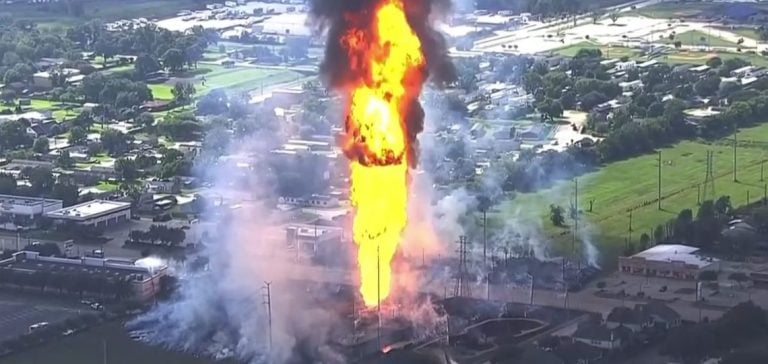A major incident occurs in the natural liquids pipeline sector, as an Energy Transfer pipeline carrying Y-grade natural liquids catches fire near Houston.
This event led to evacuations and sheltering orders in the region, underlining the risks associated with the operation of these infrastructures.
Local authorities reacted swiftly, implementing safety measures to protect nearby residents and workers.
The 20-inch diameter pipeline in question is specifically designed to transport natural liquids such as ethane, propane, butane and gasolines.
According to Energy Transfer, there were no injuries, although one firefighter was treated for minor injuries.
Deer Park Mayor Jerry Mouton told a press conference that the fire could continue to burn for several hours, even into the night.
“All the product has to burn,” he said, emphasizing the complex nature of the situation.
Impact on the NGL market
The fire had an immediate impact on the natural liquids market, with propane prices rising.
Propane values on the Platts market climbed to 67.50 cents per gallon, reaching their highest level since the beginning of the month.
The rise is attributed to uncertainty surrounding the incident and reduced supply on the market.
Traders are reacting quickly, and a position for propane is entering the market evaluation process for the first time in a week, reflecting reactive market dynamics.
Analysts note that the situation could have long-term implications for NGL prices, depending on the duration of the fire and Energy Transfer’s ability to manage the situation.
Cassidy Lamb, spokesperson for Energy Transfer, said, “The line has been isolated so that residual product in the line can burn safely.”
However, no precise estimate is given as to how long this process will take.
Pipeline investigation and safety
The incident also attracts the attention of regulators, with the Texas Railroad Commission announcing an investigation into the circumstances surrounding the fire.
Pipeline safety inspectors are working with local authorities to determine the cause of the fire and assess the safety measures in place.
The Commission noted that the fire occurred in a pipeline corridor, raising questions about the safety of surrounding infrastructure.
Preliminary reports indicate that an unknown vehicle may have entered the pipeline right-of-way prior to the fire.
Although Mayor Mouton confirmed the presence of a vehicle, he avoided speculating on a direct link to the fire.
This uncertainty underlines the importance of a thorough investigation to understand the causes of the incident and prevent similar events in the future.
Consequences for industry
This incident highlights the challenges facing the pipeline industry, particularly in terms of safety and risk management.
Companies operating in this sector must not only comply with strict regulations, but also anticipate potential impacts on the market and public perception.
Incident management and communication with stakeholders are essential to maintaining trust and security.
Recent events are also a reminder of the importance of a robust, well-maintained infrastructure.
Companies need to invest in leak detection and monitoring technologies to minimize the risk of similar incidents in the future.
Collaboration between pipeline operators and regulators is crucial to ensure the safety of systems and the protection of surrounding communities.
The repercussions of this incident on the NGL market and on the perception of pipeline safety could influence the investment decisions and operational strategies of companies in the sector.
Industry players must remain vigilant and proactive in order to navigate an ever-changing environment marked by technical and regulatory challenges.






















